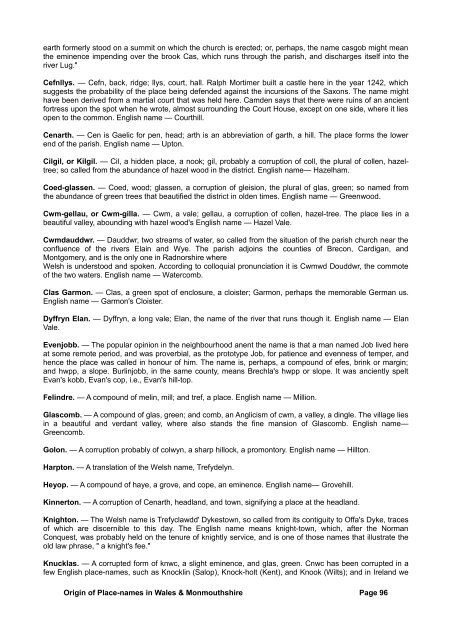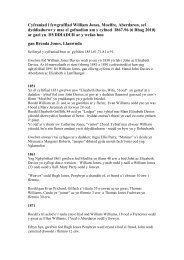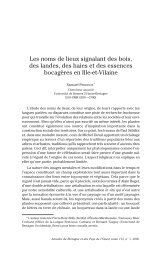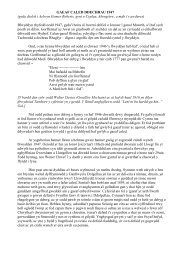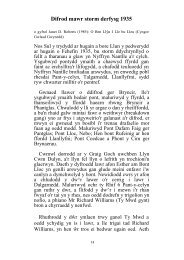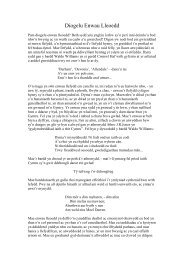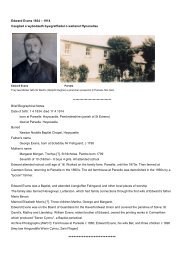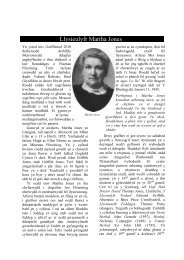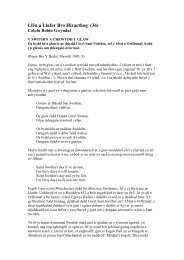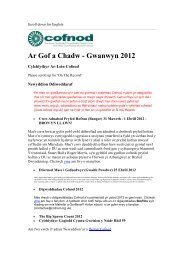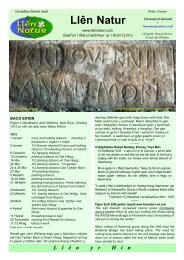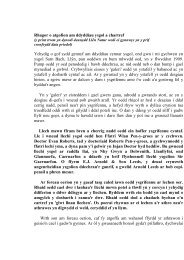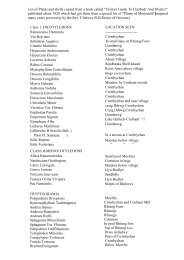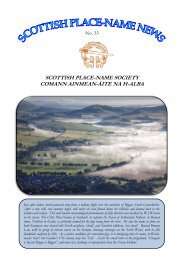Tref<strong>in</strong>. — A corruption probably <strong>of</strong> Treyf<strong>in</strong>, a boundary-<strong>place</strong>. English name — Markton.Tenby. — Called <strong>in</strong> Welsh D<strong>in</strong>bych y Pysgod. The word pysgod, fish, is <strong>the</strong> differentia added to dist<strong>in</strong>guish Itfrom its <strong>names</strong>ake <strong>in</strong> North Wales. Some ma<strong>in</strong>ta<strong>in</strong> it is a corrupt Anglicism <strong>of</strong> <strong>the</strong> <strong>orig<strong>in</strong></strong>al name, d<strong>in</strong>bychan,<strong>the</strong> little fortification or camp. The English name .affords an ethnological evidence <strong>of</strong> <strong>the</strong> temporaryoccupation <strong>of</strong> <strong>the</strong> Danes. Ten is a mutation <strong>of</strong> Dane, <strong>and</strong> by is Norse for a dwell<strong>in</strong>g, a residence, an abode;hence <strong>the</strong> name* signifies <strong>the</strong> dwell<strong>in</strong>g-<strong>place</strong> <strong>of</strong> <strong>the</strong> Danes. Danesby would be <strong>the</strong> correct name. We haveDanby, <strong>the</strong> Dane's abode <strong>in</strong> Yorkshire, <strong>and</strong> sixteen <strong>place</strong>s <strong>in</strong> <strong>the</strong> north-east counties <strong>of</strong> Engl<strong>and</strong> calledDenton, <strong>the</strong> Dane's town.RADNORSHIRE.The Welsh name, Maesyfed, is variously derived. In some ancient MSS. it is written Maeshyfaidd, whichsignifies a l<strong>and</strong> <strong>of</strong> boldness, or a martial region. We are <strong>in</strong>formed <strong>in</strong> <strong>the</strong> British " Triads " that three exiledpr<strong>in</strong>ces, Gwrgai, Cadafaell <strong>and</strong> Hyfaidd Hir, <strong>the</strong> son <strong>of</strong> Caradog Freichfras, were on account <strong>of</strong> <strong>the</strong>ir militaryprowess made k<strong>in</strong>gs; <strong>the</strong> former two <strong>in</strong> <strong>the</strong> north, <strong>and</strong> Hyfaidd Hir <strong>in</strong> <strong>the</strong> south. Some are <strong>of</strong> op<strong>in</strong>ion that <strong>the</strong>latter was made k<strong>in</strong>g <strong>of</strong> Radnor, <strong>and</strong> hence his name was bestowed upon it. O<strong>the</strong>rs adhere to <strong>the</strong> presentorthography, Maesyfed, which signifies " <strong>the</strong> imbib<strong>in</strong>g meadow," or " <strong>the</strong> dr<strong>in</strong>k<strong>in</strong>g l<strong>and</strong>," from <strong>the</strong> fact that <strong>the</strong>little river Somergill suddenly s<strong>in</strong>ks <strong>in</strong>to <strong>the</strong> earth <strong>in</strong> <strong>the</strong> vic<strong>in</strong>ity <strong>of</strong> New Radnor, <strong>and</strong> <strong>the</strong>n follows asubterranean course for a considerable distance. The popular derivation among <strong>the</strong> <strong>in</strong>habitants isMaesyfedw, from <strong>the</strong> abundance <strong>of</strong> birch-groves <strong>in</strong> <strong>the</strong> county. The English name, Radnor, was given to it <strong>in</strong><strong>the</strong> reign <strong>of</strong> Henry VIII., <strong>and</strong> signifies <strong>the</strong> red district. We f<strong>in</strong>d Radford <strong>in</strong> Notts, Radlow <strong>in</strong> Hereford, Redcliff <strong>in</strong>Gloucester, &c.Aberedwy. — From <strong>the</strong> river Edwy that flows through <strong>the</strong> <strong>place</strong>. Edwy is probably a derivative <strong>of</strong> eddu, topress on, to go. Or, perhaps, <strong>the</strong> right word<strong>in</strong>g is aidwy, signify<strong>in</strong>g <strong>the</strong> lively water. We adopt <strong>the</strong> latter.English name — Briskmouth.Abbey Cwm Hir. — Cwm Hir, long vale. Cadwallon ab Madoc built an abbey here <strong>in</strong> <strong>the</strong> year 1143; hence<strong>the</strong> name. English name— Longton Abbey.Beguildy. — A corruption probably <strong>of</strong> BugeiUdy y <strong>the</strong> shepherd's house, a very appropriate name <strong>in</strong> asheep-rear<strong>in</strong>g district. English name — Swa<strong>in</strong>ham.Bettws-Clyro. — Bettws has been expla<strong>in</strong>ed already. Clyro is a corruption <strong>of</strong> clear-wy, <strong>the</strong> clear water.English name — Waterby.Blethfa. — Some derive it from blith, milk; <strong>and</strong> man, a <strong>place</strong>; signify<strong>in</strong>g a dairy <strong>place</strong>. It is sometimes speltBllddfa as a contraction <strong>of</strong> Bleddyn-fan, Bleddyn's <strong>place</strong>. Bleddyn was <strong>the</strong> name <strong>of</strong> several bards <strong>in</strong> <strong>the</strong> years1090- 1260. We <strong>in</strong>cl<strong>in</strong>e to th<strong>in</strong>k it is a compound <strong>of</strong> blaidd, wolf; <strong>and</strong> man, <strong>place</strong>. English name — Wolfham.Bough rood. — Edmunds th<strong>in</strong>ks it is a corruption <strong>of</strong> buwchffrwd, <strong>the</strong> cow's brook. We ra<strong>the</strong>r th<strong>in</strong>k it is anAnglicised form <strong>of</strong> Bachrhyd, which is a compound <strong>of</strong> bachog, crooked, hav<strong>in</strong>g many turn<strong>in</strong>gs or w<strong>in</strong>d<strong>in</strong>gs;<strong>and</strong> rhyd, a ford. A streamlet that discharges itself <strong>in</strong>to <strong>the</strong> Wye, near <strong>the</strong> village, is called Bachwy, <strong>the</strong>me<strong>and</strong>er<strong>in</strong>g water. The Wye makes a sharp turn<strong>in</strong>g here. Mai<strong>and</strong>ros, a river <strong>in</strong> Phrygia, is proverbial for itsmany w<strong>in</strong>d<strong>in</strong>gs, whence came <strong>the</strong> word me<strong>and</strong>er. Some th<strong>in</strong>k <strong>the</strong> right word<strong>in</strong>g is Bach-rhyd, signify<strong>in</strong>g “<strong>the</strong>little ford " on <strong>the</strong> Wye, where a boat <strong>and</strong> horse were <strong>in</strong> constant attendance. English name- Me<strong>and</strong>erford.Croesfeilig. — Croes, cross; Meilig, <strong>the</strong> name <strong>of</strong> <strong>the</strong> son <strong>of</strong> Caw, <strong>and</strong> a sa<strong>in</strong>t <strong>of</strong> <strong>the</strong> fifth century. Englishname — Meilig's Cross.Cregr<strong>in</strong>a. — A mutilation <strong>of</strong> Crugynau, heaps. English name — Heapton.Colfa. — A corruption <strong>of</strong> Collfa, which means <strong>the</strong> <strong>place</strong> <strong>of</strong> <strong>the</strong> hazel-wood. English name — Hazelton.Cascob. — In " Domesday Book " it is called Cascope, which, accord<strong>in</strong>g to some, is a compound <strong>of</strong> cask<strong>and</strong> hope. Mr. Williams, <strong>in</strong> his " History <strong>of</strong> Radnorshire," derives it thus: " Cas, a fortress; <strong>and</strong> cope, anem<strong>in</strong>ence. The justness <strong>of</strong> this etymology is confirmed by tradition, which reports that a small fortification <strong>of</strong>Orig<strong>in</strong> <strong>of</strong> Place-<strong>names</strong> <strong>in</strong> Wales & Monmouthshire Page 95
earth formerly stood on a summit on which <strong>the</strong> church is erected; or, perhaps, <strong>the</strong> name casgob might mean<strong>the</strong> em<strong>in</strong>ence impend<strong>in</strong>g over <strong>the</strong> brook Cas, which runs through <strong>the</strong> parish, <strong>and</strong> discharges itself <strong>in</strong>to <strong>the</strong>river Lug."Cefnllys. — Cefn, back, ridge; llys, court, hall. Ralph Mortimer built a castle here <strong>in</strong> <strong>the</strong> year 1242, whichsuggests <strong>the</strong> probability <strong>of</strong> <strong>the</strong> <strong>place</strong> be<strong>in</strong>g defended aga<strong>in</strong>st <strong>the</strong> <strong>in</strong>cursions <strong>of</strong> <strong>the</strong> Saxons. The name mighthave been derived from a martial court that was held here. Camden says that <strong>the</strong>re were ru<strong>in</strong>s <strong>of</strong> an ancientfortress upon <strong>the</strong> spot when he wrote, almost surround<strong>in</strong>g <strong>the</strong> Court House, except on one side, where it liesopen to <strong>the</strong> common. English name — Courthill.Cenarth. — Cen is Gaelic for pen, head; arth is an abbreviation <strong>of</strong> garth, a hill. The <strong>place</strong> forms <strong>the</strong> lowerend <strong>of</strong> <strong>the</strong> parish. English name — Upton.Cilgil, or Kilgil. — Cil, a hidden <strong>place</strong>, a nook; gil, probably a corruption <strong>of</strong> coll, <strong>the</strong> plural <strong>of</strong> collen, hazeltree;so called from <strong>the</strong> abundance <strong>of</strong> hazel wood <strong>in</strong> <strong>the</strong> district. English name— Hazelham.Coed-glassen. — Coed, wood; glassen, a corruption <strong>of</strong> gleision, <strong>the</strong> plural <strong>of</strong> glas, green; so named from<strong>the</strong> abundance <strong>of</strong> green trees that beautified <strong>the</strong> district <strong>in</strong> olden times. English name — Greenwood.Cwm-gellau, or Cwm-gilla. — Cwm, a vale; gellau, a corruption <strong>of</strong> collen, hazel-tree. The <strong>place</strong> lies <strong>in</strong> abeautiful valley, abound<strong>in</strong>g with hazel wood's English name — Hazel Vale.Cwmdauddwr. — Dauddwr, two streams <strong>of</strong> water, so called from <strong>the</strong> situation <strong>of</strong> <strong>the</strong> parish church near <strong>the</strong>confluence <strong>of</strong> <strong>the</strong> rivers Ela<strong>in</strong> <strong>and</strong> Wye. The parish adjo<strong>in</strong>s <strong>the</strong> counties <strong>of</strong> Brecon, Cardigan, <strong>and</strong>Montgomery, <strong>and</strong> is <strong>the</strong> only one <strong>in</strong> Radnorshire whereWelsh is understood <strong>and</strong> spoken. Accord<strong>in</strong>g to colloquial pronunciation it is Cwmwd Douddwr, <strong>the</strong> commote<strong>of</strong> <strong>the</strong> two waters. English name — Watercomb.Clas Garmon. — Clas, a green spot <strong>of</strong> enclosure, a cloister; Garmon, perhaps <strong>the</strong> memorable German us.English name — Garmon's Cloister.Dyffryn Elan. — Dyffryn, a long vale; Elan, <strong>the</strong> name <strong>of</strong> <strong>the</strong> river that runs though it. English name — ElanVale.Evenjobb. — The popular op<strong>in</strong>ion <strong>in</strong> <strong>the</strong> neighbourhood anent <strong>the</strong> name is that a man named Job lived hereat some remote period, <strong>and</strong> was proverbial, as <strong>the</strong> prototype Job, for patience <strong>and</strong> evenness <strong>of</strong> temper, <strong>and</strong>hence <strong>the</strong> <strong>place</strong> was called <strong>in</strong> honour <strong>of</strong> him. The name is, perhaps, a compound <strong>of</strong> efes, br<strong>in</strong>k or marg<strong>in</strong>;<strong>and</strong> hwpp, a slope. Burl<strong>in</strong>jobb, <strong>in</strong> <strong>the</strong> same county, means Brechla's hwpp or slope. It was anciently speltEvan's kobb, Evan's cop, i.e., Evan's hill-top.Fel<strong>in</strong>dre. — A compound <strong>of</strong> mel<strong>in</strong>, mill; <strong>and</strong> tref, a <strong>place</strong>. English name — Million.Glascomb. — A compound <strong>of</strong> glas, green; <strong>and</strong> comb, an Anglicism <strong>of</strong> cwm, a valley, a d<strong>in</strong>gle. The village lies<strong>in</strong> a beautiful <strong>and</strong> verdant valley, where also st<strong>and</strong>s <strong>the</strong> f<strong>in</strong>e mansion <strong>of</strong> Glascomb. English name—Greencomb.Golon. — A corruption probably <strong>of</strong> colwyn, a sharp hillock, a promontory. English name — Hillton.Harpton. — A translation <strong>of</strong> <strong>the</strong> Welsh name, Trefydelyn.Heyop. — A compound <strong>of</strong> haye, a grove, <strong>and</strong> cope, an em<strong>in</strong>ence. English name— Grovehill.K<strong>in</strong>nerton. — A corruption <strong>of</strong> Cenarth, headl<strong>and</strong>, <strong>and</strong> town, signify<strong>in</strong>g a <strong>place</strong> at <strong>the</strong> headl<strong>and</strong>.Knighton. — The Welsh name is Trefyclawdd' Dykestown, so called from its contiguity to Offa's Dyke, traces<strong>of</strong> which are discernible to this day. The English name means knight-town, which, after <strong>the</strong> NormanConquest, was probably held on <strong>the</strong> tenure <strong>of</strong> knightly service, <strong>and</strong> is one <strong>of</strong> those <strong>names</strong> that illustrate <strong>the</strong>old law phrase, " a knight's fee."Knucklas. — A corrupted form <strong>of</strong> knwc, a slight em<strong>in</strong>ence, <strong>and</strong> glas, green. Cnwc has been corrupted <strong>in</strong> afew English <strong>place</strong>-<strong>names</strong>, such as Knockl<strong>in</strong> (Salop), Knock-holt (Kent), <strong>and</strong> Knook (Wilts); <strong>and</strong> <strong>in</strong> Irel<strong>and</strong> weOrig<strong>in</strong> <strong>of</strong> Place-<strong>names</strong> <strong>in</strong> Wales & Monmouthshire Page 96
- Page 1 and 2:
HANDBOOK OF THE ORIGIN OF PLACE-NAM
- Page 3 and 4:
§ § § § §The Author begs to st
- Page 5 and 6:
pitiful cries of the railway offici
- Page 7 and 8:
Bishop Percy says that "in England,
- Page 9 and 10:
The city of Chester is still popula
- Page 11 and 12:
There's Cumwhitton, Cumwhinton, Cum
- Page 13 and 14:
Llwyn in its primary' sense means a
- Page 15 and 16:
PLACE-NAMES IN WALES.Wales. — The
- Page 17 and 18:
Church are generally dedicated to e
- Page 19 and 20:
think he was a contemporary of St.
- Page 21 and 22:
Rhosbeirio. — Rhos, a moor, a dry
- Page 23 and 24:
of Brecknock," states that this vic
- Page 25 and 26:
Cam cnwir ef Cwmdu,Cwm gwyn yw & n
- Page 27 and 28:
Penderyn. — A corruption probably
- Page 29 and 30:
Ardudwy. — Ar, upon or above; tud
- Page 31 and 32:
to mark its pre-eminence over the o
- Page 33 and 34:
Some think that eirw is a corruptio
- Page 35 and 36:
present form — Caerfyrddin.Abergw
- Page 37 and 38:
place of refuge; hence the name. En
- Page 39 and 40:
Llansawyl. — The church was dedic
- Page 41 and 42:
eject. The village took its name fr
- Page 43 and 44:
house, and attempted to kill an inf
- Page 45 and 46:
Gwydir. — Prima facie one may tak
- Page 47 and 48: Nefyn. — The church was probably
- Page 49 and 50: DENBIGHSHIRE.Anglicized form of Din
- Page 51 and 52: Llangollen. — From Collen, a sain
- Page 53 and 54: hands into their pockets to pay a c
- Page 55 and 56: Cefn. — The name signifies a ridg
- Page 57 and 58: Maesgarmon. — Named in honour of
- Page 59 and 60: Abertridwr. — Tridwr, three water
- Page 61 and 62: it is said, was originally built by
- Page 63 and 64: Cwmllynfell. — Cwm, a narrow vale
- Page 65 and 66: Gwarycaeau. — Gwdr, the nape of t
- Page 67 and 68: means a cultivated region, a vale,
- Page 69 and 70: Penrhiwfer.- Pen, head, top; rhiw,
- Page 71 and 72: Port Talbot. — So called in 1835
- Page 73 and 74: Trealaw. — This appellation was g
- Page 75 and 76: Aberdyfi. — So called from its si
- Page 77 and 78: Llanddwywe. — From Dwywau, a desc
- Page 79 and 80: Crickhowell and some in the directi
- Page 81 and 82: Griffithstown. — This village was
- Page 83 and 84: and gwy, water. Treiddiod troth tna
- Page 85 and 86: derive Tintern from din, fortified
- Page 87 and 88: Caersws. — It appears that the Ro
- Page 89 and 90: English name — Ervylton.Llanymech
- Page 91 and 92: Angle. — Probably from the angle-
- Page 93 and 94: Gellyswick. — Another hybrid. Gel
- Page 95 and 96: that the two rivers in their flowin
- Page 97: ecame the bishop of the see, and wa
- Page 101 and 102: Pilleth. — A corruption of pwll,
- Page 103 and 104: Howells, Rev. J., Mountain AshHowel
- Page 105 and 106: Williams, D., PenywernWilliams, Rev


